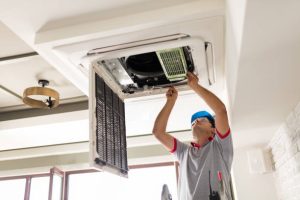
Heating, ventilation, and air conditioning (HVAC) systems play a crucial role in maintaining a comfortable indoor environment throughout the year. However, not all HVAC systems are created equal when it comes to energy efficiency. Understanding HVAC efficiency ratings is essential for homeowners looking to save money on their energy bills and reduce their carbon footprint.
The most common HVAC efficiency rating you’ll encounter is the Seasonal Energy Efficiency Ratio (SEER). SEER measures how efficiently an air conditioner or heat pump operates over an entire cooling season. The higher the SEER rating, the more efficient the system is at cooling your home. In general, a SEER rating of 14 or higher is considered efficient.
Another important efficiency rating to be aware of is the Energy Efficiency Ratio (EER). EER measures how efficiently an air conditioner operates at a specific temperature and humidity level. While SEER provides a more comprehensive picture of overall efficiency, EER can give you a better idea of how well a system will perform under specific conditions.
For furnaces and boilers, Annual Fuel Utilization Efficiency (AFUE) is the key efficiency rating to look out for. AFUE measures how efficiently a heating system converts fuel into heat over an entire heating season. A higher AFUE rating indicates greater energy efficiency. For example, a furnace with an AFUE rating of 90% means that 90% of the fuel consumed by the system is converted into usable heat.
It’s also worth noting that some hvac service near me systems come with additional certifications like ENERGY STAR® which signifies that they meet strict energy efficiency guidelines set by the U.S Environmental Protection Agency (EPA). ENERGY STAR certified products are typically more efficient than standard models and can help you save money on your utility bills while reducing your environmental impact.
When shopping for a new HVAC system, it’s important to consider both initial cost and long-term savings from energy efficiency. While high-efficiency systems may have a higher upfront price tag, they can often pay for themselves through lower monthly utility bills over time.
In conclusion, understanding HVAC efficiency ratings is essential for making informed decisions about your home comfort systems. By choosing high-efficiency equipment with favorable ratings like SEER, EER, AFUE or ENERGY STAR certification , you can enjoy greater comfort in your home while saving money on energy costs and reducing your environmental impact.
Detroit Heating and Cooling Co.
2917 Moon Lake Dr, West Bloomfield Township, Michigan, 48323
(248) 665-8111






